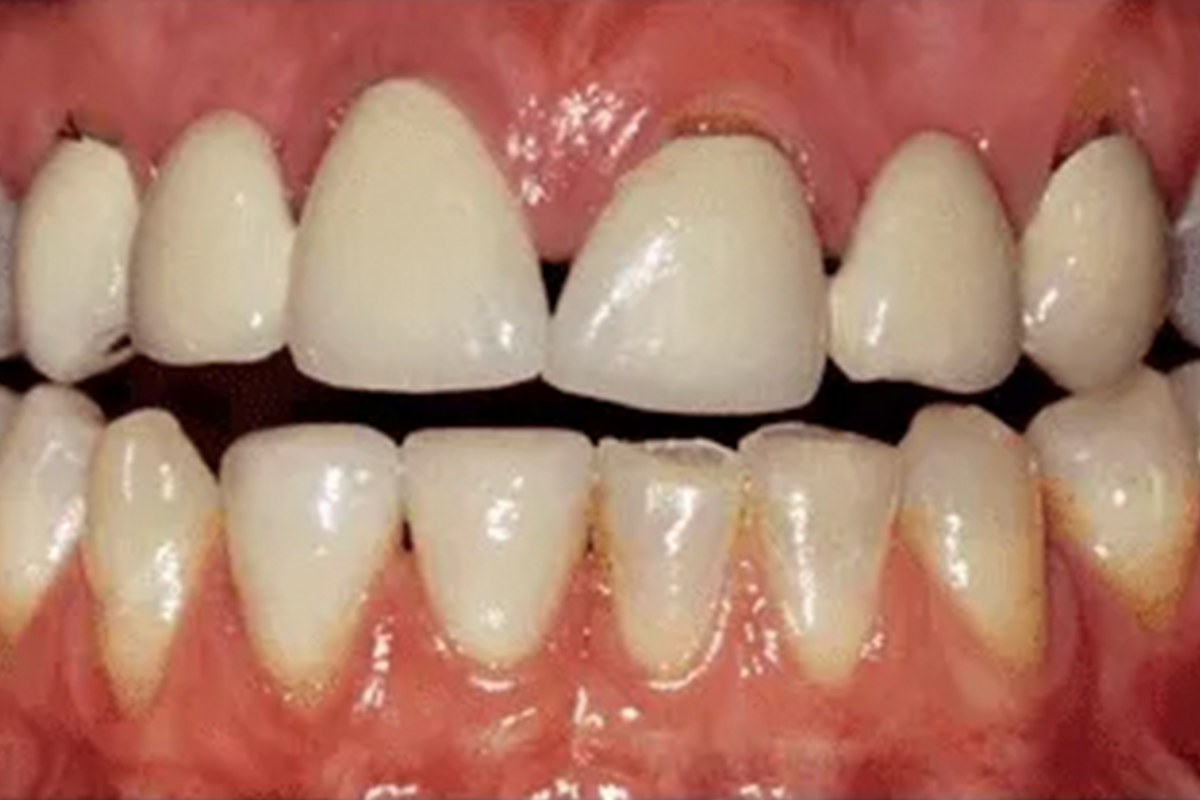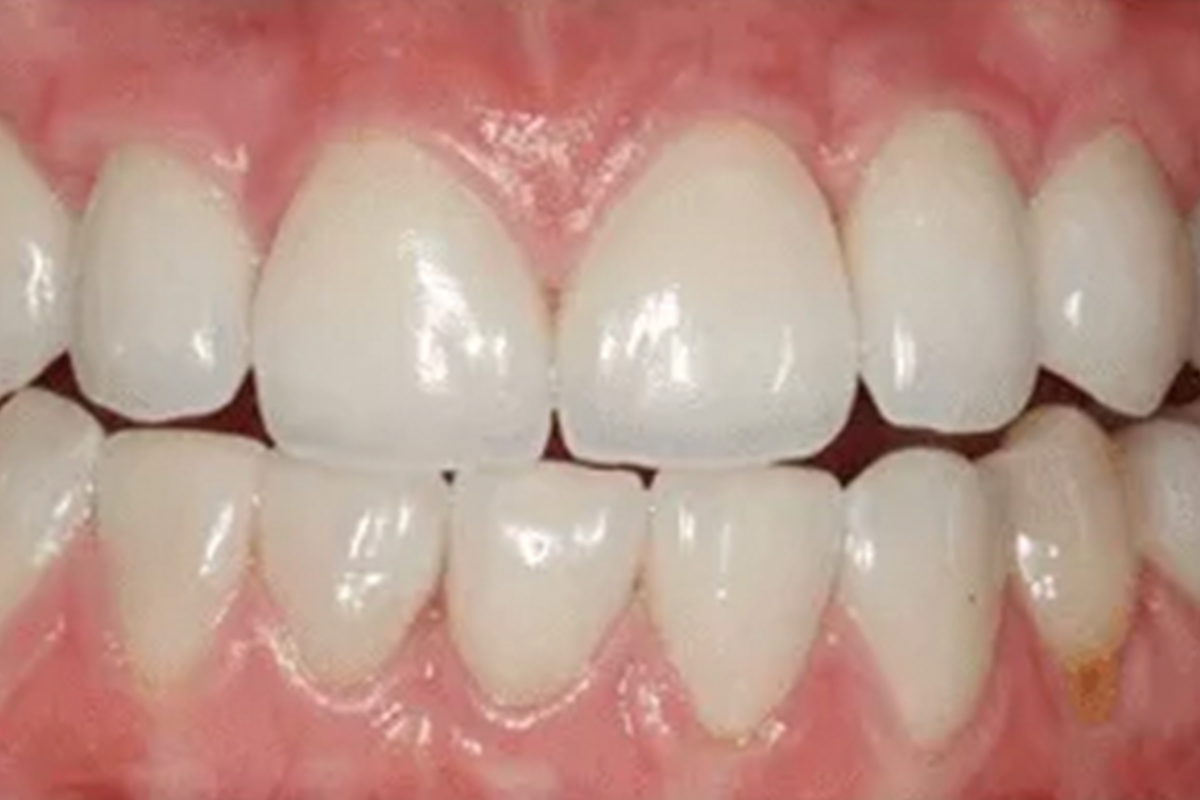Protecting your gums is essential for maintaining your healthy smile. Gum disease, also known as periodontal disease, is a very common oral health issue that can degrade the health of your gums, especially if it goes untreated. That’s why Dr. Agamov offers gum disease treatment at her Sharon, MA office.
What Is Gum Disease?
Gum disease is a bacterial infection that attacks the soft tissues of your gums. According to the Center for Disease Control, about half of all adults age 30 and older will be affected at some point in their life by a periodontal infection.
The main cause of gum disease is plaque, a sticky substance that can appear white or yellowish. It accumulates on the teeth and gums as the result of food particles mixing with the bacteria in your mouth. Plaque has to be removed regularly with brushing and flossing before it can harden into tartar, or calculus, which can’t be removed without professional help.
Plaque and tartar multiply into more bacteria, which produce a harmful acid as waste. If these substances aren’t removed, they can cause tooth decay and infect your gums, leading to periodontal disease.

Other Causes of Gum Disease
Plaque, while often the main cause of gum disease, isn’t the only culprit. Other causes of gum disease include:
- Lack of regular oral hygiene
- Tobacco use
- Diabetes
- Stress
- Clenching and grinding teeth
- Genetics
- Medication
- Poor nutrition
Stages of Gum Disease
Gum disease doesn’t happen all at once, it occurs in stages that increase in severity as the disease progresses.
The first stage is called gingivitis, and it’s the only stage of the disease that can be reversed completely. Gingivitis may cause:
- Redness of the gums
- Minor swelling
- Inflammation
However, when gingivitis first starts to take hold, you may not notice any symptoms at all. This is one reason why regular checkups with Dr. Agamov are so important — she can recognize and treat warning signs before they become apparent at home.
Once gum disease progresses to initial or slight periodontitis, the effects of the disease can’t be reversed, but they can be stopped. Initial periodontitis is when the disease starts to attack the gum tissue and bone supporting your teeth. You may not feel any pain during this stage, but other common symptoms of initial periodontitis include:
- Bleeding gums when you clean your teeth
- Swelling
- Redness
- Inflammation
- Damage to the bone
- Pockets of bacteria beneath gum tissue
The next stage of the disease is called moderate periodontitis, which is similar to initial periodontitis in terms of symptoms. You may still not feel any pain, however, the infection becomes even more aggressive. More gum and bone tissue is destroyed and the bacteria can potentially enter your bloodstream and travel to other parts of your body.
The final stage of gum disease is advanced periodontitis, which involves the aggressive destruction of your gum and bone tissue, often leading to tooth loss.
- Loosened teeth
- Pus-filled abscesses on your gums
- Painful chewing
- Severe halitosis (bad breath)
- Deepened pockets of bacteria beneath your gums
At this point, surgery and regular deep cleanings will be necessary to save your teeth and restore stable oral health.
Preventing Gum Disease
The sooner gum disease is caught, the more easily it can be reversed or resolved. Dr. Agamov recommends staying on the lookout for the previously mentioned signs of the disease as well as:
- Exposed tooth roots
- Tooth sensitivity
- Shrinking gums
- Gum tenderness
- Misalignment
- Changes in the fit of your dentures
If you notice any of these signs, be sure to schedule an appointment at our Sharon, MA office as soon as possible. Dr. Agamov will work to restore your oral health and protect your teeth and gums from additional harm.

What Is Scaling and Root Planing?
Scaling and root planing is a deep cleaning process that involves using small handheld tools to remove excess plaque and tartar. The plaque is gently scraped away from your teeth, gums, and below the gum line. Afterwards, the roots of your teeth are planed, or smoothed, to discourage any further growth of bacteria and help the gums reattach to the bone. This treatment can halt the progression of infection and reverse the condition in its early stages.

Great dentist, take good care of your teeth while also making sure you have a nice looking smile.
-John S.

FAQ
Is gum disease life-threatening?
Gum disease is not usually life threatening on its own, but an untreated infection can cause more harm by spreading to other parts of your body. According to Harvard Health, people with gum disease may be two to three times more likely to develop heart disease.
Is gum disease contagious?
Gum disease is caused by bacteria, which means it can in fact be passed from person to person, although not through casual contact. It usually takes repeated contact through activities such as kissing or sharing silverware and drinks for gum disease to be passed on to another person.
How can I stop gum disease from getting worse?
Besides seeing Dr. Agamov for regular deep cleanings, you should also:
- Avoid alcohol and tobacco products
- Rinse with warm salt water or an antimicrobial mouthwash after meals
- Brush gently to prevent gum recession
- Stay hydrated
- Limit sugar intake
- Exercise regularly to boost your immune system and reduce inflammation
Dr. Agamov will be sure to give you specific tips and advice on how to prevent your particular case from worsening or flaring up again after treatment.
How much does it cost to treat gum disease?
The exact cost of your treatment will depend on several factors, including the stage of your gum disease and your insurance coverage. Please contact your insurance provider ahead of time and ask them which costs they can cover.
Gum Disease Treatment Means Healthier Smiles
The sooner an infection of the gums is caught and treated, the better the outcomes for your oral and overall health. Don’t wait for gum disease to jeopardize your smile, contact our Sharon, MA office. You can also submit one of our contact forms and a friendly team member will return your message shortly.


